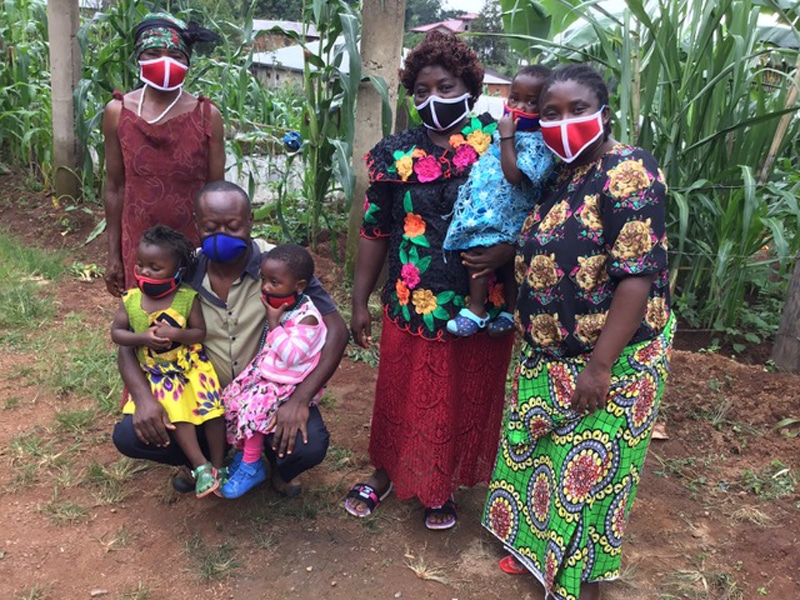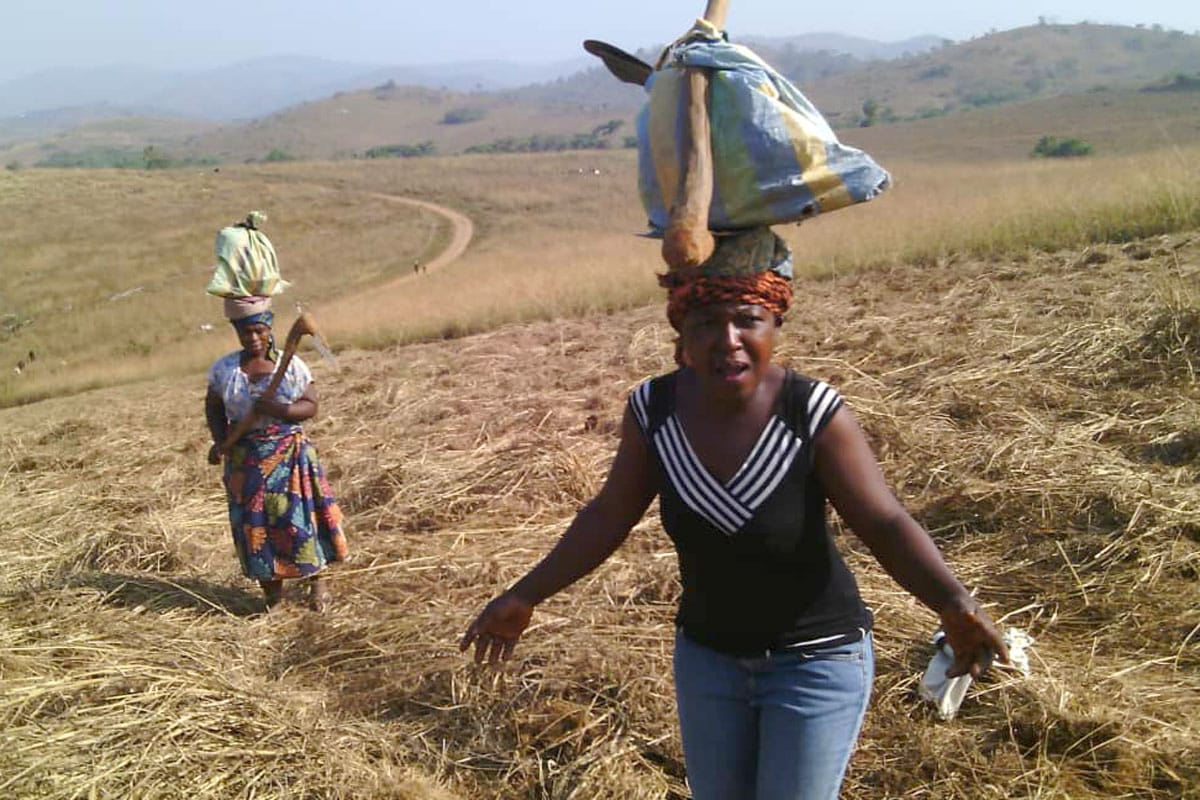Thank You and Update from Cameroon

Dear friends and supporters,
Thank you to everyone from the global network that supported our efforts in Cameroon. As you may have seen on the news, the COVID-19 cases are rising in in Cameroon and our communities are doing our best to gear up to stay safe. Unfortunately, Cameroon is second only to South Africa in the number of COVID-19 cases. But thanks to your generosity, we have been able to purchase masks for young people, orphans and widows in two communities near Bamenda that were unprepared for the pandemic.

Unfortunately, the COVID-19 makes the other issues plaguing our community even harder to address. As I reported in my last update, the deadly clashes which have mostly been in the rural areas have led farmers to abandon their farms.

This have led to severe food shortages because local food sources are no longer available and global food chains are also disrupted because of the conflict. However, with you support, we were able to purchase fertilizers to restart the farming and purchase emergency foodstuffs for the internally displaced during this crisis.

Many problems show up in communities when times are hard. Your support also helped us do some other things that our community needed:
- we assisted a father that needed medical care for his leg
- we gave direct cash assistance to 6 families in crisis, and
- we continue to build self-sustaining and ecologically sound support for communities to help themselves.

On behalf of the community of Bamenda, Cameroon, thank you for your generosity and solidarity!
Sincerely,
Alexander Gwanvalla
GATHER Global Fellow and President, Community Green Engagement Cameroon
GATHER Alum Supports Community Amidst Conflict in Cameroon
By Jimmie Briggs, Director of Learnign
In the last two weeks alone, more than 8,000 Cameroonian refugees have streamed across the border into neighboring Nigeria, fleeing an increasingly high intensity conflict between the national government and English-speaking militias seeking to form a breakaway state called “Ambazonia.” For Global GATHER alumnus Alexander Gwanvalla, the deteriorating situation has placed ever greater burdens on the work of his organization, Community Green Engagement. Speaking by phone last weekend from northwest Cameroon where he lives and works, Alexander described a crisis situation with food and resources rapidly dwindling.

“Farming activities are mostly carried out in rural areas and due to the deadly clashes happening now between soldiers and militias, farmers have fled and abandoned their farms,” he explained.
“This has resulted in dire food shortages because the food sources are no longer available. There is a state of insecurity, some of our members are also fleeing the country, and we are also facing ‘lockdown’ days where we cannot leave our homes and go to work because of the danger.” -- Alexander Gwanvalla
In total, 60,000 Cameroonian refugees have left the country for Nigeria, and even to the United States.

In practical terms, constant gunfire and risk of other physical violence by one of the warring groups makes it next to impossible for Alexander and his colleagues to meet with community decision-makers and thought-leaders. During last week’s elections on February 9, separatists from the English-speaking part of the country imposed a six-day lockdown on all civilian movement and reiterated their demand that English-speaking senators and parliamentarians quit the national senate and parliament. They’ve consistently threatened the lives of individuals who engage the legislative bodies in any way.

Last December, Cameroon’s parliament granted special status to the northwest and southwest regions of the country, which are predominantly English-speaking. Despite those concessions toward autonomy, the militias have pushed back for years against perceived disenfranchisement by the country’s French-speaking majority. The struggle for independence by the insurgents has been the biggest challenge for President Paul Biya, in power for four decades, even as the country faces off against Boko Haram terrorists who’ve long ravaged the Lake Chad Basin.
Though his work with Citizens Climate Lobby has been dramatically hampered since 2017, Alexander and his community allies continue to create impact in their region, in spite of the existential challenges.
“We have continued to focus on building our community assets via consultation and this approach has been welcomed,” Alexander said.
“We usually carry out our activities during days that are calm and mostly in areas not really hit by the crisis. Normally, we take all precautions before going out. So far, we have planted trees, installed beehives, and hosted radio programs on the rights of the child at a local radio station.” -- Alexander Gwanvalla
The conscription of child soldiers by militia poses a threat to a community’s youth.
“Food, food is a biggest challenge now,” he continued, “being able to access it as the fighting goes.”
Water on our Mind
Water Crisis Declared in Mindanao
Officials of Butuan City in restive Mindanao have declared an unprecedented "state of water crisis" after more than a month of severe water shortage that has affected the lives of the more than 200,000 residents.
As the story reports, this crisis was brought on by the last natural disaster that struck the southern Philippines in December, the tropical storm "Seniang."
Our own Global Associate, Dr. Susana Anayatin continues to bring clean water to residents and school children in the same region, by maintaining the water wells restored by the Goldin Institute in recent years. We will continue to monitor the official announcement from Butuan City with Susana and post up-to-date developments on how she and her community is being impacted by the current crisis. The interactive map demonstrating our work with Susana in the region can be viewed here.
Clean Water Not Just an Issue in the Philippines
In Zambia, this recent story points out their own crisis. Over 5 million people are thought to be without clean drinking water. Directly from the piece, WaterAid country representative Fatoumata Haidara commented on the how this impacts Zambia:
[quote]A lack of sanitation is a public health issue as people are affected by their neighbours and communities' sanitation status as well as their own. The implications of not improving access to clean water and good sanitation will have a spiral effect on all the other sectors such as health and education."[/quote]
In a related story, a public health consultant furthers the case that sanitation efforts would lead to cleaner water on the African continent and cites the serious challenges that need to be addressed:
Africa has the lowest water supply and sanitation coverage of any other region in the world. It is estimated that one in three Africans has no access to improved water or to sanitation facilities and the number of people lacking those basic services is increasing. The majority of those lacking basic services live in informal or suburban areas and rural communities. Unless actions are taken now, the absolute number of people lacking basic services will increase from 200 million in 2000 to 400 million in 2020.
New Standards Being Set - New Breakthroughs Being Made
The Joint Monitoring Programme for Water Supply and Sanitation or (JMP), recent research published online, recommends a new standard for how "we measure progress toward universal access," said Jamie Bartram, the Don and Jennifer Holzworth Distinguished Professor of environmental sciences and engineering at the UNC Gillings School of Global Public Health and director of the Water Institute. "Drinking-water and sanitation are essential for good human health and the benefits are maximized when delivered at home." See more on this story here.
And in this recent editorial by a former U.S. policymaker and physician, Bill Frist speaks to 'clean water as a currency for peace' and why we should legislate towards helping achieve clean and safe water around the world:
[quote]In my own experiences as a physician regularly leading medical mission trips, I am constantly struck that providing medical assistance and public health services to others is interpreted as a currency of peace and ultimately as an aspect of public diplomacy. Our assistance to other nations in these areas seems to accelerate in impact when it provides tangible benefits to everyday people. The Water for the Poor Act has been proven."[/quote]
Finally, we found this story about a Haitian-American janitor at Princeton working singlehandedly to help bring clean water to his home village. Here is an excerpt from the full piece:
 As a young boy growing up in La Source, Lajeunesse and his brother Chrismedonne would make the treacherous three-hour climb up and down the side of a mountain to reach a spring. It was the only way they could get clean water for their family. They watched as their fellow villagers got sick from drinking contaminated water from the river below or injured themselves climbing the mountain trying to do the same ... it was after the 2010 Earthquake that he would take action, and Lajeunesse raised $38,000 with students at Princeton to build the pipeline that would bring clean water to La Source. Raising the money was only the beginning. Building the pipeline would prove immensely challenging and take the strength of the entire village to accomplish. Yet eventually, it came to be.
As a young boy growing up in La Source, Lajeunesse and his brother Chrismedonne would make the treacherous three-hour climb up and down the side of a mountain to reach a spring. It was the only way they could get clean water for their family. They watched as their fellow villagers got sick from drinking contaminated water from the river below or injured themselves climbing the mountain trying to do the same ... it was after the 2010 Earthquake that he would take action, and Lajeunesse raised $38,000 with students at Princeton to build the pipeline that would bring clean water to La Source. Raising the money was only the beginning. Building the pipeline would prove immensely challenging and take the strength of the entire village to accomplish. Yet eventually, it came to be.

